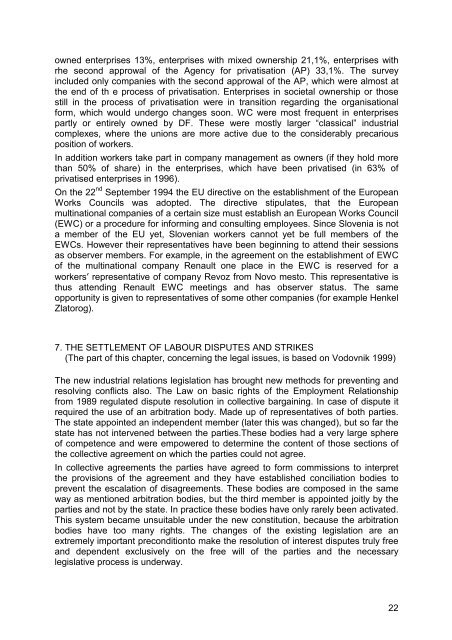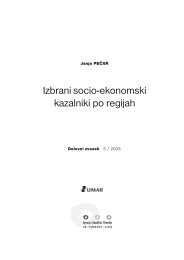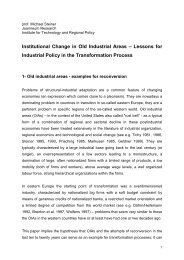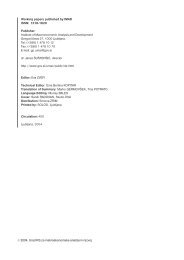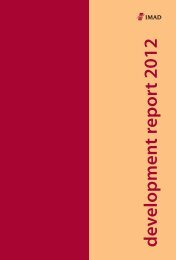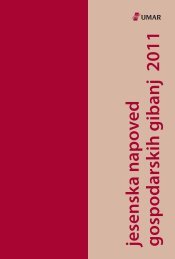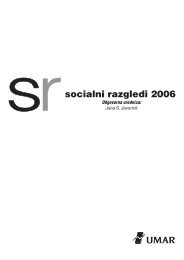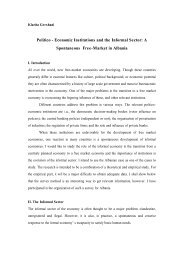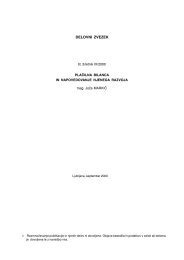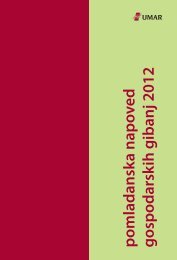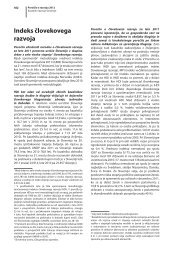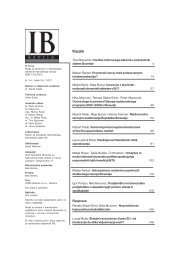The Development of New Industrial Relations in Slovenia - UMAR
The Development of New Industrial Relations in Slovenia - UMAR
The Development of New Industrial Relations in Slovenia - UMAR
Create successful ePaper yourself
Turn your PDF publications into a flip-book with our unique Google optimized e-Paper software.
owned enterprises 13%, enterprises with mixed ownership 21,1%, enterprises with<br />
rhe second approwal <strong>of</strong> the Agency for privatisation (AP) 33,1%. <strong>The</strong> survey<br />
<strong>in</strong>cluded only companies with the second approwal <strong>of</strong> the AP, which were almost at<br />
the end <strong>of</strong> th e process <strong>of</strong> privatisation. Enterprises <strong>in</strong> societal ownership or those<br />
still <strong>in</strong> the process <strong>of</strong> privatisation were <strong>in</strong> transition regard<strong>in</strong>g the organisational<br />
form, which would undergo changes soon. WC were most frequent <strong>in</strong> enterprises<br />
partly or entirely owned by DF. <strong>The</strong>se were mostly larger “classical” <strong>in</strong>dustrial<br />
complexes, where the unions are more active due to the considerably precarious<br />
position <strong>of</strong> workers.<br />
In addition workers take part <strong>in</strong> company management as owners (if they hold more<br />
than 50% <strong>of</strong> share) <strong>in</strong> the enterprises, which have been privatised (<strong>in</strong> 63% <strong>of</strong><br />
privatised enterprises <strong>in</strong> 1996).<br />
On the 22 nd September 1994 the EU directive on the establishment <strong>of</strong> the European<br />
Works Councils was adopted. <strong>The</strong> directive stipulates, that the European<br />
mult<strong>in</strong>ational companies <strong>of</strong> a certa<strong>in</strong> size must establish an European Works Council<br />
(EWC) or a procedure for <strong>in</strong>form<strong>in</strong>g and consult<strong>in</strong>g employees. S<strong>in</strong>ce <strong>Slovenia</strong> is not<br />
a member <strong>of</strong> the EU yet, <strong>Slovenia</strong>n workers cannot yet be full members <strong>of</strong> the<br />
EWCs. However their representatives have been beg<strong>in</strong>n<strong>in</strong>g to attend their sessions<br />
as observer members. For example, <strong>in</strong> the agreement on the establishment <strong>of</strong> EWC<br />
<strong>of</strong> the mult<strong>in</strong>ational company Renault one place <strong>in</strong> the EWC is reserved for a<br />
workers′ representative <strong>of</strong> company Revoz from Novo mesto. This representative is<br />
thus attend<strong>in</strong>g Renault EWC meet<strong>in</strong>gs and has observer status. <strong>The</strong> same<br />
opportunity is given to representatives <strong>of</strong> some other companies (for example Henkel<br />
Zlatorog).<br />
7. THE SETTLEMENT OF LABOUR DISPUTES AND STRIKES<br />
(<strong>The</strong> part <strong>of</strong> this chapter, concern<strong>in</strong>g the legal issues, is based on Vodovnik 1999)<br />
<strong>The</strong> new <strong>in</strong>dustrial relations legislation has brought new methods for prevent<strong>in</strong>g and<br />
resolv<strong>in</strong>g conflicts also. <strong>The</strong> Law on basic rights <strong>of</strong> the Employment <strong>Relations</strong>hip<br />
from 1989 regulated dispute resolution <strong>in</strong> collective barga<strong>in</strong><strong>in</strong>g. In case <strong>of</strong> dispute it<br />
required the use <strong>of</strong> an arbitration body. Made up <strong>of</strong> representatives <strong>of</strong> both parties.<br />
<strong>The</strong> state appo<strong>in</strong>ted an <strong>in</strong>dependent member (later this was changed), but so far the<br />
state has not <strong>in</strong>tervened between the parties.<strong>The</strong>se bodies had a very large sphere<br />
<strong>of</strong> competence and were empowered to determ<strong>in</strong>e the content <strong>of</strong> those sections <strong>of</strong><br />
the collective agreement on which the parties could not agree.<br />
In collective agreements the parties have agreed to form commissions to <strong>in</strong>terpret<br />
the provisions <strong>of</strong> the agreement and they have established conciliation bodies to<br />
prevent the escalation <strong>of</strong> disagreements. <strong>The</strong>se bodies are composed <strong>in</strong> the same<br />
way as mentioned arbitration bodies, but the third member is appo<strong>in</strong>ted joitly by the<br />
parties and not by the state. In practice these bodies have only rarely been activated.<br />
This system became unsuitable under the new constitution, because the arbitration<br />
bodies have too many rights. <strong>The</strong> changes <strong>of</strong> the exist<strong>in</strong>g legislation are an<br />
extremely important preconditionto make the resolution <strong>of</strong> <strong>in</strong>terest disputes truly free<br />
and dependent exclusively on the free will <strong>of</strong> the parties and the necessary<br />
legislative process is underway.<br />
22


